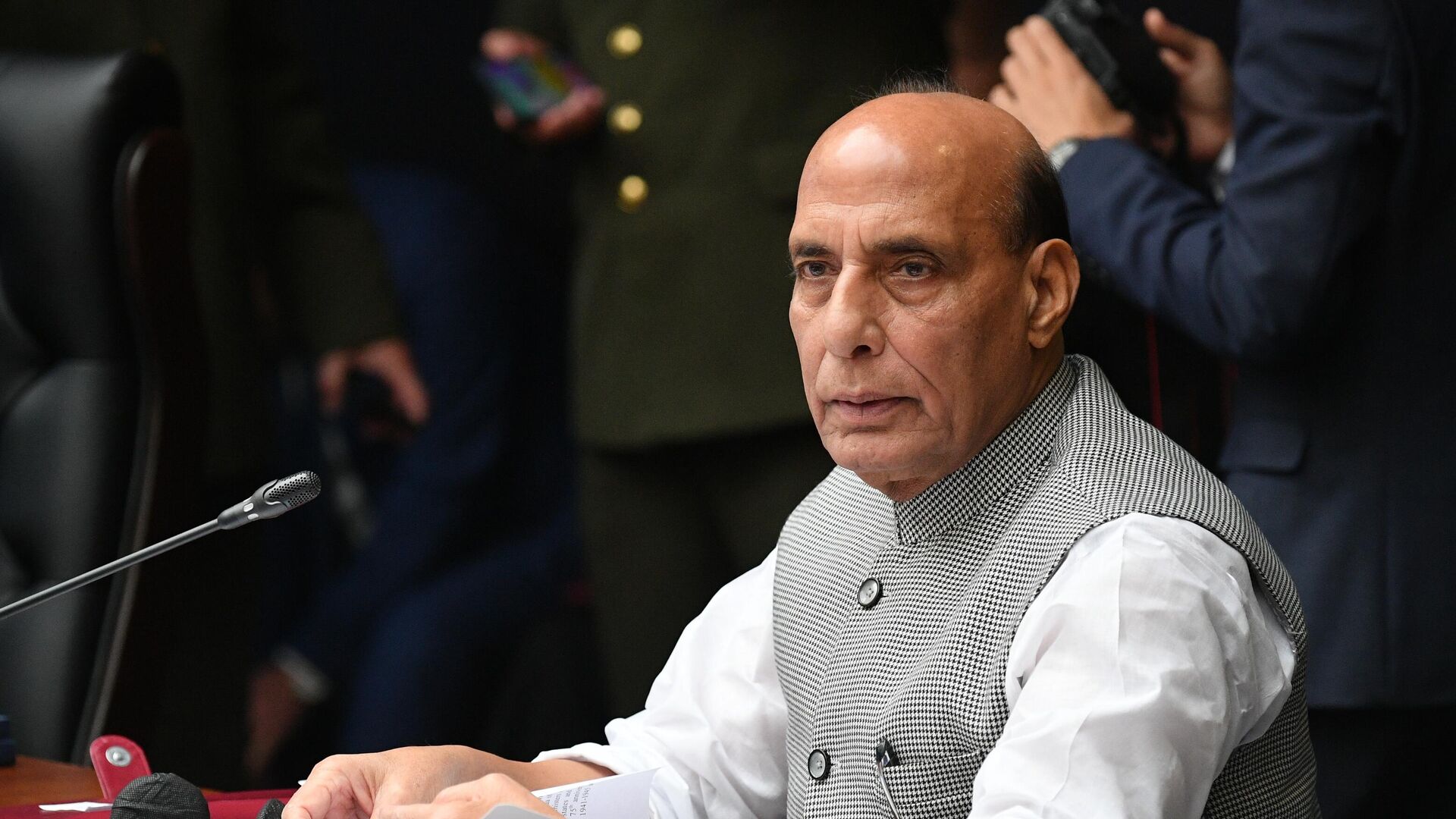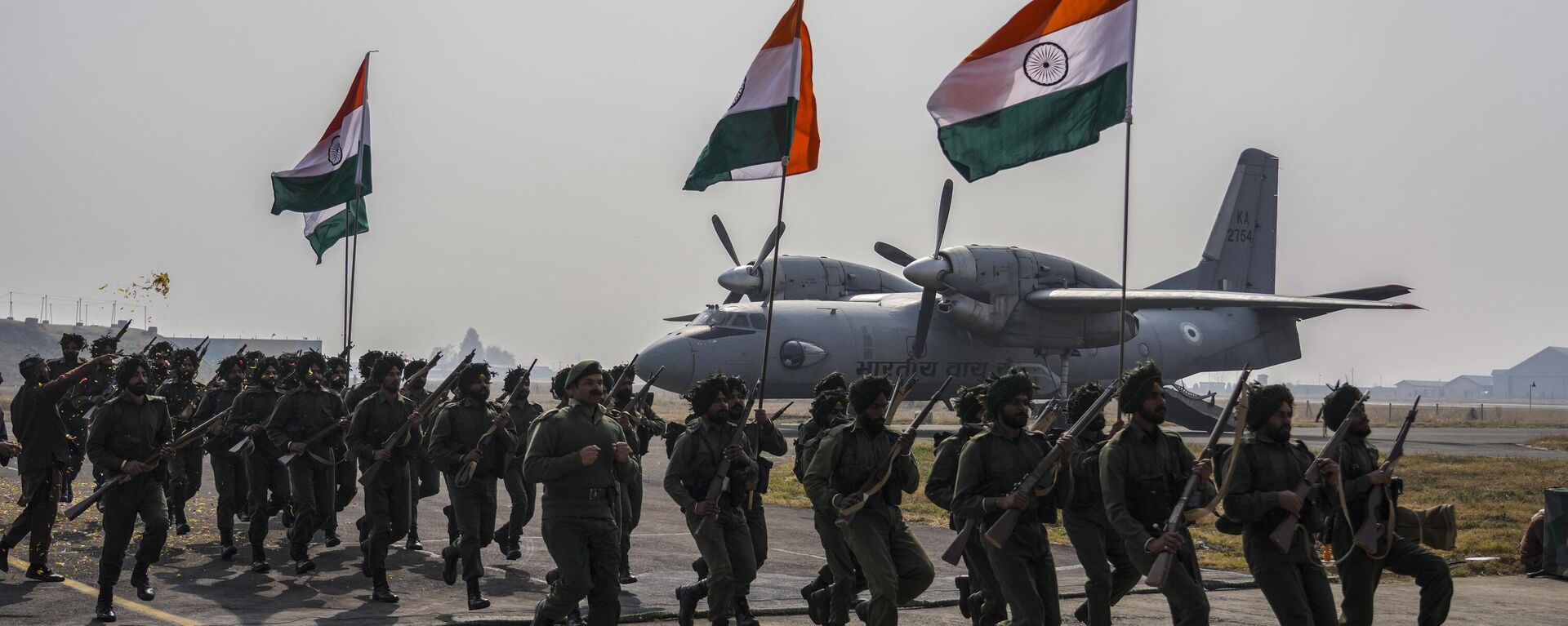https://sputniknews.in/20250916/defence-minister-exhorts-indian-armed-forces-to-be-ready-for-unconventional-threats-9768912.html
Defence Minister Exhorts Indian Armed Forces to be Ready For Unconventional Threats
Defence Minister Exhorts Indian Armed Forces to be Ready For Unconventional Threats
Sputnik India
With the Ukraine and Gaza conflicts extending to multiple years, Indian defence planners are putting plans in place to be ready for prolonged battles. 16.09.2025, Sputnik India
2025-09-16T21:07+0530
2025-09-16T21:07+0530
2025-09-16T21:07+0530
defenсe news
rajnath singh
india
ukraine
kolkata
west bengal
ministry of defence (mod)
indian army
indian navy
indian air force (iaf)
https://cdn1.img.sputniknews.in/img/07e7/07/08/2897920_0:0:3115:1753_1920x0_80_0_0_906ad8c05c316e6d597403f645638715.jpg
Indian Defence Minister Rajnath Singh on Tuesday urged the country's armed forces to move beyond traditional concepts of war and be prepared to deal with unconventional threats.He warned that biological, ecological, and information warfare, as well as ideological indoctrination, were invisible challenges that required constant vigilance to guard against, and hence, going beyond the conventional was important to win wars of the future.He highlighted that strength, strategy, and self-reliance were the three pillars that India will rely upon to emerge as a powerful nation in the 21st century.Underlining the Government of India's commitment to achieving self-reliance in the defence sector, Singh stressed that self-reliance was not a slogan, but a necessity, because it was key to India's strategic autonomy.He explained that defence indigenisation under the self-reliant India initiative was fueling economic growth, generating employment, and enhancing the capacity of shipyards, aerospace clusters, and defence corridors.
https://sputniknews.in/20250912/indias-hard-power-becoming-more-and-more-critical-defence-secretary-9752303.html
india
ukraine
kolkata
west bengal
Sputnik India
feedback.hindi@sputniknews.com
+74956456601
MIA „Rossiya Segodnya“
2025
Pawan Atri
https://cdn1.img.sputniknews.in/img/07e6/0c/13/139630_147:0:831:684_100x100_80_0_0_8fa2b25903e7787fe6a2698552c167df.png
Pawan Atri
https://cdn1.img.sputniknews.in/img/07e6/0c/13/139630_147:0:831:684_100x100_80_0_0_8fa2b25903e7787fe6a2698552c167df.png
News
en_IN
Sputnik India
feedback.hindi@sputniknews.com
+74956456601
MIA „Rossiya Segodnya“
Sputnik India
feedback.hindi@sputniknews.com
+74956456601
MIA „Rossiya Segodnya“
Pawan Atri
https://cdn1.img.sputniknews.in/img/07e6/0c/13/139630_147:0:831:684_100x100_80_0_0_8fa2b25903e7787fe6a2698552c167df.png
rajnath singh, india, ukraine, kolkata, west bengal, ministry of defence (mod), indian army, indian navy, indian air force (iaf), self-reliant india, make in india, operation sindoor
rajnath singh, india, ukraine, kolkata, west bengal, ministry of defence (mod), indian army, indian navy, indian air force (iaf), self-reliant india, make in india, operation sindoor
Defence Minister Exhorts Indian Armed Forces to be Ready For Unconventional Threats
With the Ukraine and Gaza conflicts extending to multiple years, Indian defence planners are putting plans in place to be ready for prolonged battles.
Indian Defence Minister Rajnath Singh on Tuesday urged the country's armed forces to move beyond traditional concepts of war and be prepared to deal with unconventional threats.
He warned that biological, ecological, and information warfare, as well as ideological indoctrination, were invisible challenges that required constant vigilance to guard against, and hence, going beyond the conventional was important to win wars of the future.
"Wars of today are so sudden and unpredictable that it is extremely difficult to foretell its duration. It can be two months, a year, or even five years. We need to be prepared. We need to ensure that our surge capacity remains sufficient," he said in his address at the Combined Commanders' Conference 2025 in Kolkata, West Bengal.
He highlighted that strength, strategy, and self-reliance were the three pillars that India will rely upon to emerge as a
powerful nation in the 21st century.
"Operation Sindoor has demonstrated that Strength, Strategy and Self-reliance are the three pillars that will give India the power it needs in the 21st century. Today, we have the capability to face any challenge with the help of indigenous platforms and systems coupled with the indomitable courage of our soldiers. This is the real strength of Aatmanirbhar Bharat (self-reliant India)," the minister noted.
Underlining the Government of India's commitment to achieving self-reliance in the defence sector, Singh stressed that self-reliance
was not a slogan, but a necessity, because it was key to India's strategic autonomy.
He explained that defence indigenisation under the self-reliant India initiative was fueling economic growth, generating employment, and enhancing the capacity of shipyards, aerospace clusters, and defence corridors.



